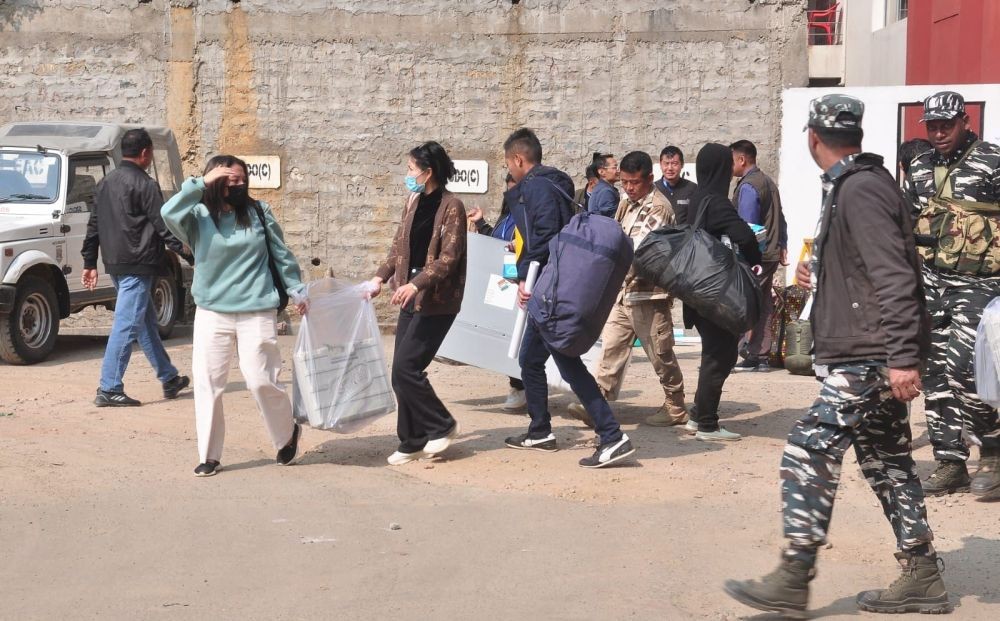Polling officials heading for duty. (Photo Courtesy: DPRO Mokokchung)

‘Election process in Nagaland is the epitome of everything that can go wrong in a democracy’
Limasenla Jamir
Mokokchung| March 6
With the conclusion of the Nagaland Assembly elections on March 2, the dust has finally settled and political talk is gradually dying away in the hearth of the houses. Political violence occurred in many parts of the state, much of which was reported and discussed.
Among the many incidents of violence, there were incidents of threat and abuse which were directed towards the officials who were on duty at various polling stations in the state. The Morung Express interviewed a few officials to get an insight into the experiences and the working of the electoral system in the state.
Threats, insults and undermining polling officers
Wati, a first timer, went for election duty as a presiding officer with the hope to experience the election process and everything that goes into electing representatives only to be dismayed by the constant threats and pressures from different groups and individuals at the polling station.
Moa, also a first timer went for her election duty with similar hopes. “Powerful on all counts in theory, the office of the presiding officer had little space in the practical world,” she narrates. “Generations that precede the day I arrived for duty, had ensured that monetary gifts are to be expected while you turn a blind eye to the illegal proxies, a voter carrying multiple slips of genuine voters, and countless other (mis)deeds that occur in the polling station. Disrupting these unethical and illegal conducts proved to be the biggest task that you could not fully succeed in, since the majority overwhelmed the minority,” she stated.
Accounts of similar incidents were also shared by two other officials who were posted as Presiding officers. “You go into the field worrying about the insurmountable amount of paper work, protocol and procedures, only for that to become secondary because of the pressure and threats from various parties, including the ward and village councils, with their vested interests. Thinly veiled threats, insults and undermining of polling officers unfortunately by those bodies that are supposed to ensure a smooth, free and fair election, was shocking,” lamented Ben.
Allen also remarked that it was very disheartening to realise that ward authorities under which the polling station falls were biased and while there were no untoward incidents at the polling station, there was tremendous pressure to toe their line.
“The election process in Nagaland is the epitome of everything that can go wrong in a democracy,” remarked Aren.
“When the rule of the jungle prevails and when money talks, the Clean Election campaign becomes a farce. While the election process prescribed by the ECI looks foolproof on paper, there are not enough stringent measures to curb the flouting of protocols and code of conduct by political parties, civil organizations and the public,” she added.
‘All boils down to money’
Allen said “Money plays a major part in our elections. While substantive proof cannot be provided for obvious reasons, it is an open secret that government officials involved in the election process are bought off left and right, under different rates, to influence the poll outcome.”
Wati also said that money power rules the election process in the state and will continue to do so. The public is less concerned with the party manifesto or the character of the candidates. “It all boils down to who offers us the most money,” Wati added.
“The demand of voters to sell their votes for different prices, the officials that are bribed with gifts as a shallow sign of trust for the election process, the party workers that actively pursue victory by using every unethical trick in the book, phrases like ‘do not turn away voters’ that allow proxies to stream in without proper identity cards, tribal bodies in red that see ‘one household, one voter’ as a rightful imposition that supersedes the actual concept of democracy that lies in ‘one person one vote’ and finally the candidates that sate all these appetites, are seen as necessities that one cannot do without,” supplemented Alem.
Alem further stated that the desire for immediate monetary gratification from all levels involved in the election process ensures that election in Nagaland is the final nail for lack of progress in infrastructure, basic amenities and unemployment, apart from showing lack of foresight as a community for its own betterment and ethical wealth and knowledge building.
‘Let us not sugarcoat wrong practices’
“Let us not sugarcoat wrong practices in the name of tradition with the excuse of ‘everyone is doing it,’ this is how it always has been. We still have a long way to go as a society to elect leaders who are deserving and have a heart for the people,” remarked Aren.
“When honest officials who want to do the right thing are persecuted and the dishonest ones valorized, the space to do good and bring change is nonexistent,” Aren added.
The election process in Nagaland is unique and there are unique ways to handle the process which the senior government officials seem to know well enough. In many of the cases, the government officials especially the new recruits were unaware of the situations that were unique to the state.
“The administration, by their actions and complacent attitude, seem to show very little regard for the well-being of polling officials they depute on government duty. The government needs to take into serious consideration the huge mental and emotional toll the elections take on the polling officials,” said Aren.
“The grueling process breaks the strongest and the bravest of all and when the government sends out civilians to the battlefield, it must take responsibility for the possible after effects and rehabilitation. Many presiding officers have been experiencing paranoia, PTSD like symptoms and depression post-polling and this is a cost that no one is talking about,” she concluded.






